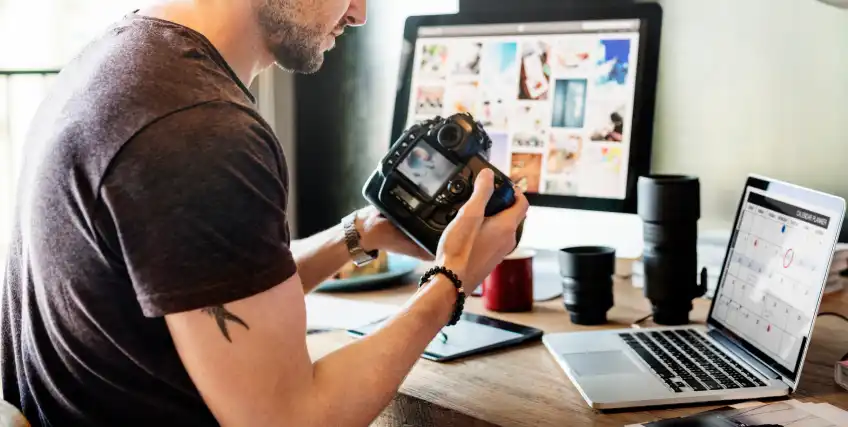How to Start a Photography Business and Get the Financing You Need
Jul 16, 2025 | Last Updated on: Jul 16, 2025

If you enjoy capturing the best moments of someone’s life on camera, you’ve probably thought about becoming a professional photographer and starting a photography business. Maybe you’ve already started one at a slow pace and want to go full-time and take it to the next level.
Either way, starting your own photography business entails more than having a good eye and taking good pictures. If you’re dreaming of opening a new business, you’ll need to think like an entrepreneur, come up with a sound business plan, and have a little bit of capital to thrive and succeed in the photography business.
We’ll show you how starting a photography business is easier than you think. We’ll also explain how to secure the funding you need to turn your creative passion into a profitable venture.
Step-by-Step Guide for Starting Your Own Photography Business
You’ll need a clear path to success once you decide that starting a photography business is for you. Here are some things to consider.
1. Define Your Niche
Most photographers specialize in certain types of photography, such as:
- Portrait photography
- Wedding photography
- Product photography
- Photojournalism
- Fashion photography
- Event photography
Narrowing your photography niche when starting a photography business can help you build a reputation in that field and hone your skills as you become an expert. This can help you stand out and attract the right clients.
2. Create a Business Plan
A sound business plan can guide your decision-making as you embark on your business venture. It also shows lenders that you’ve thought of how you’ll build your photography business and ensure its long-term growth.
Before starting a photography business, determine the type of equipment you need and which business model best fits the services you plan to offer.
For example, do you need a photography studio, or do you plan to have a physical place where potential customers come to you? Or will you travel to offer your services? Maybe you want to be a destination photographer and travel to exotic locations to shoot wedding photos.
Your business plan should include:
- Your business goals
- The photography services you plan to offer
- A market analysis that identifies your ideal clients and your competition
- A financial plan that details how much money you need, how you will use the funds, pricing strategies, and how you plan to make money
- Marketing plan
- Financial statements as requested by the lender (these may include bank account statements, tax returns, or business-related documents if you’re already a small business owner, such as cash flow statements, profit and loss statements, etc.)
3. Choose a Business Name and Register It
Keep in mind that in today’s world, branding is an essential component of business success. This is especially true when starting a photography business. So, choose a business name that fits your brand and will be easy for potential customers to remember.
Once you have chosen a name, register it with your local or state government to make it official and pay the required sales tax. Also, get a tax ID number through the IRS so you can claim business expenses and file business taxes.
4. Get Any Other Necessary Licenses and Permits
Find out which licenses and permits you’ll need for your photography business. Check with your local and state government agencies and licensing boards. You’ll also need to register with your state’s taxing authority. At this point, you may also want to consult with a CPA or business advisor on how you’ll need to handle taxes after starting a photography business.
5. Purchase Your Photography Equipment
Getting the right photography equipment for your business needs can make all the difference in your success when starting a photography business.
Some equipment to consider is:
- Cameras, lenses, and accessories such as tripods, stands, bags, and cases (Consider high-quality cameras like Canon and Nikon)
- Lighting and lighting tools
- Computer equipment (including external hard drives)
- Editing software like Adobe Lightroom for photo editing and CRM software like HoneyBook
- Memory cards
- Props and backdrops
6. Build a Portfolio of Your Work
To attract new clients when starting a photography business, you’ll need to have a portfolio of your work. Here are some ideas:
- At first, you may need to offer low-cost mini sessions or discounts to get bookings.
- Give discounts for referrals to attract even more leads.
- Consider bartering services with other professionals. This is particularly useful when cash flow is limited. For example, think about your own business needs and consider how other professionals might benefit from your services. Think wedding planners, caterers, real estate agents, or even website developers who might find your services useful.
Building a portfolio should be a priority to show to potential clients and maybe even lenders.
7. Market Your Photography Business
When starting a photography business, a marketing strategy is essential for getting the word out about your services. Thismeans having a prominent online presence through a website, social media postings, email marketing, client testimonials, and possibly paid online advertisements.
You can also pass out business cards at local businesses and to people you meet. Finally, consider attending trade shows and local community events to garner a reputation in your area.
8. Explore Funding Options
Starting a photography business will take some cash to do it properly. While you can likely start small and grow your business over time, at some point, you’ll need to take the next step and get a business loan to ensure a successful photography business.
You’ll likely need business financing more than once while operating your business, from startup funding to expansion opportunities in the future. Our next section provides deeper insight into photography business loans and how to use them to your advantage.
Understanding Photography Business Loans
Photography business loans can help you achieve your professional goals when starting a photography business, whether during the startup phase or as an established professional wanting to upgrade equipment to better serve clients or expand your services.
Small business loans can also help manage your photography business’s day-to-day operations or cover cash flow needs during a slow period. There’s a financing solution to suit almost any business need.
Here’s what you need to know about the types of loans available, how to qualify, and where to find the right lenders.
Types of Business Financing for Photographers
Your photography business may benefit from small business financing at some point. Here are some common types of financing:
Business Lines of Credit
A line of credit is a great option when you’re first starting a photography business or you have small financing needs. It works much like a credit card: you’re approved at a set credit limit and can draw from the limit as needed.
The great thing is you only pay interest on the amount of credit used, and the limit resets as you pay it back. Lines of credit are great for meeting unexpected expenses or helping manage cash flow during slower periods.
Equipment Financing
There are very few loans more useful when starting a photography business than an equipment loan. After all, the majority of your expenses will involve purchasing or upgrading photography equipment to run and operate your business.
Business loans for business equipment purchases are also easier to get when you don’t have an extensive business history because the equipment is used as collateral for the loan.
Term Loans
A term loan is a type of small business loan that can cover various business needs, ranging from equipment purchases to leasing a studio and meeting operational expenses. With a term loan, you receive a lump sum of capital upfront and repay the loan in equal monthly payments over a set period.
A term loan can be short-term or long-term, depending on your business needs and the lender’s criteria. It can be a little more challenging to qualify for a term loan when starting a photography business, particularly if you aren’t purchasing a large amount of expensive equipment with the loan, don’t have collateral, or lack a lot of business history for lenders to evaluate.
SBA Loan for Photographers
SBA loans are offered by approved SBA lenders and backed by the U.S. Small Business Administration. They usually have longer repayment periods and lower interest rates than other small business loan options.
However, the application process can be somewhat comprehensive and time-consuming.
Revenue-based Financing
Revenue-based financing has become a more common funding solution in recent years as it meets the needs of modern small business owners. This option is particularly useful for entrepreneurs who have a lot of delayed invoices and payments and need very fast funding. Lenders who offer revenue-based financing provide cash advances on future accounts receivable.
Qualifying for a Business Loan
Lenders evaluate several criteria when qualifying small business loan applications. These factors include:
- Credit scores: Some lenders look at only personal credit scores, while others will also evaluate your business credit score. A higher personal credit score will usually result in a better chance of getting approved and better loan terms.
- Business plan: As covered in the previous section, a business plan is essentially a blueprint for how you plan to achieve success. It’s vital for helping lenders feel more confident about funding your photography venture.
- Cash flow projections: This shows how you earn and spend money for your business and where repaying a loan fits into that. A cash flow projection conveys to a lender that you can repay a loan and that you’re able to manage new debt.
Exploring Lender Options When Starting a Photography Business
There are generally three main options when it comes to lenders when starting a photography business.
These include:
- Banks and Credit Unions: These traditional lenders offer competitive interest rates. However, they have strict lending criteria and lengthy and complicated application processes.
- SBA-approved Lenders: SBA lenders can typically offer you excellent terms, but the application process is time-consuming and funding may be slow to come.
- Online Lenders: Reputable online lenders have become lifelines for small business owners. They provide fast, flexible funding solutions and an easier application process, making them a great choice for photographers with lower credit scores and diverse business histories.
Conclusion
Starting a photography business can be an exciting venture if you love being behind the camera. But it’s essential to lay the foundation so your business is a long-term success.
Turning your passion for photography into a profitable business means thinking strategically, from choosing a niche to branding and marketing and getting the right financing to meet your business goals and needs.
Whether you need funds for high-quality photography gear, a studio, or your business’s day-to-day operations, there are several financing options suited to your needs. Having good credit, preparing a solid business plan, and choosing the right lender can help you get the capital needed to bring your artistic vision to life.
FAQs About Starting a Photography Business
1. How much money do I need to start a photography business?
The amount of capital you’ll need will vary, depending on the equipment purchased, whether or not you have a studio, and the type of business model you choose. New photographers can expect to spend as little as $2,000 to $20,000 for a home-based photography business, to $50,000 or more if you operate out of a studio.
2. How do I start a photography business with no money?
If you have a decent camera, you can keep business expenses down and start small. Some solutions to make this happen include using free online tools like Canva and Pixlr for photo editing and Wix for website building. You can also do time-for-print sessions with models and influencers to build your portfolio.
3. What’s the average profit margin for a photography business?
Professional Photographers of America puts this number at approximately 50%. Of course, this can depend on the type of gigs you work and how much overhead you have.
4. Do I need to have a business license or insurance when starting a photography business?
Most local and state governments require a business license to operate legally, even if you have no studio and work from home or on location as a wedding photographer. You should also have general liability insurance and equipment insurance when starting a photography business to protect yourself from client disputes, accident claims, and damage to your equipment.
5. Can I get a photography business loan if I have bad credit?
Some online lenders have financing options for borrowers with less-than-perfect credit. However, you may have to pay higher interest or provide collateral. If you’re purchasing equipment with the loan, you’ll have an easier time qualifying. Strengthening other parts of your application, like a solid business plan and clear revenue projections, can also improve your chances.
Frequent searches leading to this page
Term Loans are made by Itria Ventures LLC or Cross River Bank, Member FDIC. This is not a deposit product. California residents: Itria Ventures LLC is licensed by the Department of Financial Protection and Innovation. Loans are made or arranged pursuant to California Financing Law License # 60DBO-35839




